Term Page
Policy Advocacy 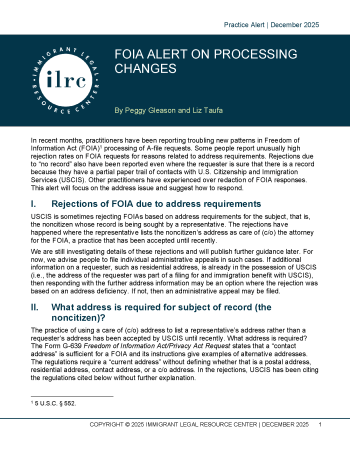
In recent months, practitioners have been reporting troubling new patterns in FOIA processing of A-file requests. Some people report unusually high rejection rates on Freedom of Information Act (FOIA) requests for reasons related to address requirements. Rejections due to “no record” also have been reported even where the requester is sure that there is a record because they have a partial paper trail of contacts with USCIS. Frequent over redaction of FOIA responses also has been reported. This alert discusses the address issue and suggests how to respond.
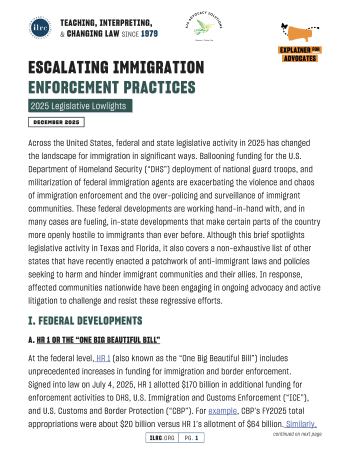
This brief spotlights legislative activity in Texas and Florida, it also covers a non-exhaustive list of other states that have recently enacted a patchwork of anti-immigrant laws and policies seeking to harm and hinder immigrant communities and their allies.
From October 3-7, 2025, Goodwin Simon Strategic Research surveyed a statewide representative sample of 1,213 registered voters. The poll explored voter attitudes towards mass deportation, recent ICE actions, and sanctuary protections in the state. Uniquely, this poll explores key themes that may be driving Californians’ growing disapproval of mass deportation, including revealing voters’ strong support for due process, including for people with past records, and equal treatment in the legal system, regardless of immigration status. Voters also expressed deep concern with the cost of the Trump administration’s approach to immigration on taxpayers.
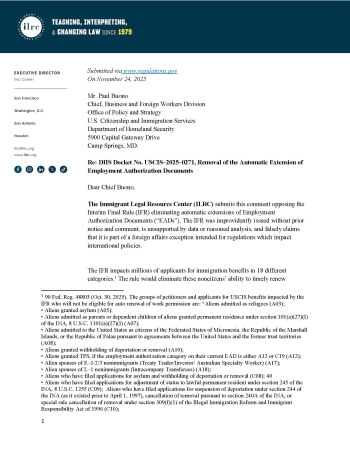
ILRC submitted this comment on November 25, 2025 opposing the Interim Final Rule (IFR) eliminating automatic extensions of Employment Authorization Documents (“EADs”). The IFR was improvidently issued without prior notice and comment, is unsupported by data or reasoned analysis, and falsely claims that it is part of a foreign affairs exception intended for regulations which impact international policies.
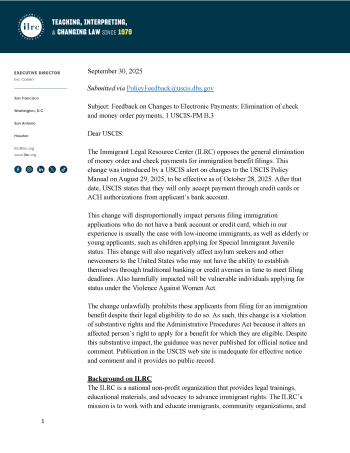
The Immigrant Legal Resource Center (ILRC) opposes the general elimination of money order and check payments for immigration benefit filings. This change was introduced by a USCIS alert on changes to the USCIS Policy Manual on August 29, 2025, to be effective as of October 28, 2025. The new guidance states that all applications filed October 28, 2025, or after must pay by ACH bank account payment, credit or debit card, or pre-paid card. No bank checks, certified checks, personal checks or money orders will be accepted thereafter.
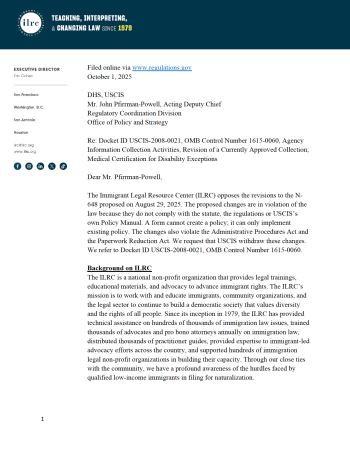
On September 30, 2025, ILRC submitted this comment to USCIS to oppose the proposed changes to the N-648 and request that they be withdrawn. The changes create a series of substantial obstacles for naturalization applicants applying for a disability waiver of the English/civics requirement. The proposed changes create a form more than twice the length (10 pp.) of the current form (just over 4 pp.) that creates an undue burden on applicants and the medical professional who must complete the N-648. It also doubles the burden of time for USCIS adjudicators who must review this form.
The barrier that these changes would pose is prejudicial to eligible waiver applicants. Standards expressed in the revised form are outside any guidance provided by the statute, regulations and USCIS Policy Manual. The form purports to create law and invents barriers to eligibility in areas where no such law has been established by legitimate guidance.
The barrier that these changes would pose is prejudicial to eligible waiver applicants. Standards expressed in the revised form are outside any guidance provided by the statute, regulations and USCIS Policy Manual. The form purports to create law and invents barriers to eligibility in areas where no such law has been established by legitimate guidance.
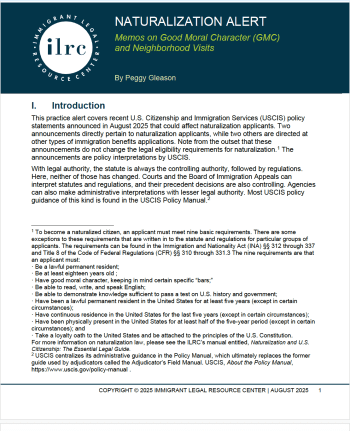
This practice alert covers recent U.S. Citizenship and Immigration Services (USCIS) policy statements announced in August 2025 that could affect naturalization applicants.
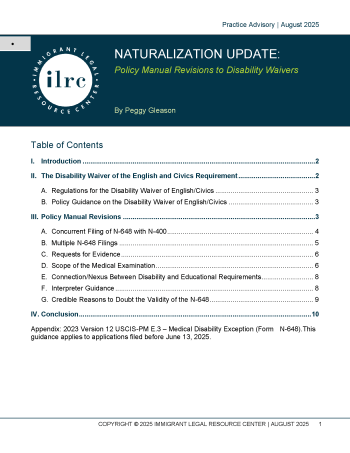
This practice advisory provides background on the disability waiver of the English and civics requirement for naturalization and describes the June 2025 revisions to the USCIS Policy Manual (PM) on the submission and review of disability waivers. The revised guidance in the PM applies to applications filed on or after the publication date of June 13, 2025. Overall, the PM revisions signal a change in tone that assumes fraud in the disability waiver process is frequent and encourages increased scrutiny by USCIS adjudicators.
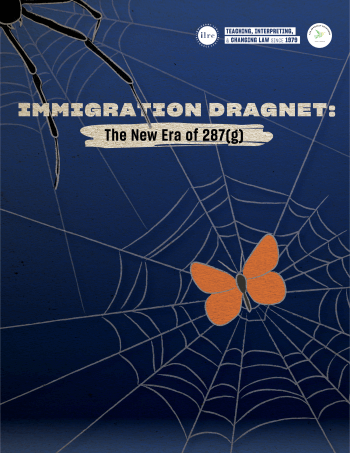
Section 287(g) of the Immigration and Nationality Act (“INA”) authorized the creation of a program that allows state and local law enforcement agencies to act as immigration enforcement agents.This policy brief reviews the recent history of 287(g) agreements and how they’ve proliferated, describes the three 287(g) agreement models, examines a case study of escalating 287(g) programs in Florida, delves into the programs’ dangers and harms, and provides some recommendations for local communities that want to stop 287(g) agreements in their tracks.
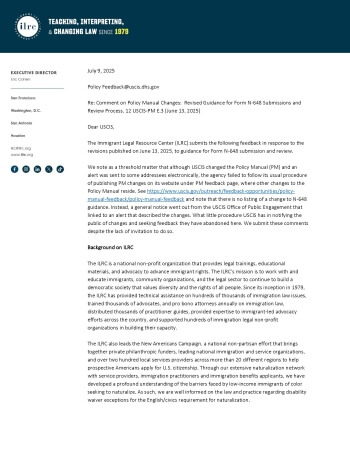
ILRC submitted a comment to USCIS in response to the revisions published on June 13, 2025 to guidance for disability waivers of the English and civics requirement for naturalization. ILRC opposed the 2025 revisions as they rely on a false narrative that fraud is rampant in the disability waiver process.